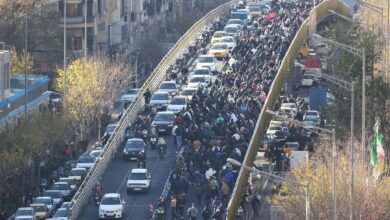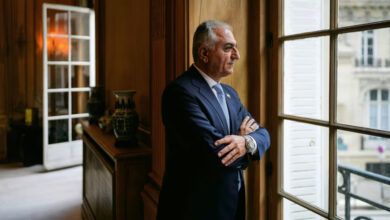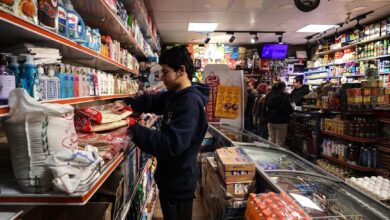In 2011, the Egyptian economy took a pummeling from the revolution. In 2012, it looks like it will be coming to terms with a new political reality.
Over the past 12 months, the economy has suffered in the face of camel charges through Tahrir Square, clouds of tear gas, Molotov cocktails, sidewalks turned into projectiles, bullets both rubber and real, and the collective grief for the nearly 1000 people killed in violence between protestors and the state.
But the market has suffered most acutely from fear. Since January, politicians and generals have threatened the population with the specter of chaos. Anxiety over an economic collapse has been a constant concern — and sometimes tool — of Egypt’s rulers.
“Egypt is going through some difficult times, and it is not right to continue on this course, because it has affected our economy and we have lost, day after day,” former president Mubarak told the crowds in Tahrir on 10 Febuary. “And it is putting Egypt through a situation where people who have called for reform will be the first ones to be affected by it.”
Hearing the speech, protestors in the square raised their shoes in a sign of defiance.
Increasingly though, Egyptians whose livelihoods have been hurt by the protests are criticizing those who are still taking to the streets, resulting in an ever-widening rift in opinion.
Revolutionary fallout
When the stock market closed two days into the protests, it was unclear when it was going to open again. International companies withdrew staff and fears of looting closed shops. The disappearance of police forces fueled concerns about a security vacuum. Tourists fled. Future tourists withdrew reservations. Foreign investors backed out. Many continue to hold their breath until after presidential elections, expected to be held in June.
The exchange’s re-opening date was postponed more than once due to fears of a mass sell-off. Those fears were justified when trading resumed two months later, and the market fell 5 percent in its opening minute.
It’s been a financial guessing game since then. Violence between the military and protestors has scarred an already sluggish recovery.
In November, Standard and Poor’s downgraded Egypt’s sovereign debt rating after clashes. The cut signified a lack of investor confidence in the Egyptian military’s handling of the interim period and meant that Egypt’s government bonds are now a high-risk bet for investors, known as junk bonds.
By summer, though, shops were open, and some Egyptians were growing tired with the social turmoil.
On a warm June morning, Magdy Adly opened his pharmacy to another day of protest. He said he was proud of his role in the revolution in February, when his shop supplied field hospitals and treated wounded protestors, but he was worried about the decreasing stream of customers.
“It’s a good thing for our shop to be famous,” he said. “But the problem is for us, we need to be good in sales too.”
International help
There’s been a lack of consensus on how to cover the government’s growing budget deficit, which has swelled by 30 percent in the past year from LE98 billion to LE130 billion in September.
One solution to the deficit would be international loans, since Egyptian already has a very high rate of domestic borrowing. Egypt’s interim leaders have repeatedly given mixed signals on their acceptance of money from international financial institutions, which have said since June that they are ready to lend to Egypt.
A rotation of finance ministers (three since Mubarak left office) has not led to a consistent policy.
Under Samir Radwan, the first post-Mubarak finance minister, the country accepted millions of dollars in loans, investments, and gifts from Gulf countries, but turned down money from the International Monetary Fund (IMF).
In a June interview with Al Jazeera, Radwan said the reason for the rejection of IMF and World Bank money was that neither the government nor the military council wanted to leave behind “a legacy of debt.” Instead, the government borrowed from domestic banks.
Since then, there’s been a near-constant back-and-forth between the Egyptian government and the Washington-based fund. The game came to an end in the last week of October, when, according to the Ministry of International Cooperation, the IMF cancelled a visit to Cairo due to the negative prospects for Egypt’s economy.
A new kind of economy
In the midst of the most recent cabinet re-shuffling, Prime Minister Ganzouri said the economy was “worse than anyone imagines,” an ambiguous statement that did little to calm foreign or domestic investors’ fears.
The changing political landscape has also spurred fears. After the Nour Party (Egypt's largest Salafi political party) and the Muslim Brotherhood’s Freedom and Justice Party (FJP) took the majority of seats in the first two rounds of parliamentary elections, foreign investors and domestic businessmen have worried about what kind of impact a Sharia-based economy could have on profits. Islamic law places some restrictions on interest-earning.
At a 26 December press conference designed to assure investors that the new government would be market-friendly, the Egyptian Exchange hosted representatives of Islamist parties that have been elected to parliament.
Mahmoud Abbas, a member of the Nour Party and an investor in Egyptian stocks since 2006, said buying and selling stocks is not necessarily against Islamic law. Rather, he said, it depends on the practices of the company.
“We are optimistic, that, God willing, the stock market will double again soon,” he said, recalling that the exchange was actually worth less in 2009 than today, and recovered.
Representatives from liberal and moderate parties also confirmed their support of fair, open exchange policies.
Adel Hamid of the FJP said that the new parliament would be responsible for the recuperation of the economy. He said FJP members plan to designate certain businesses as being compliant with Islamic law, by decree of the religious authority of Al-Azhar.
Shariah-compliant investment choices, he said, could attract investors that had previously been scared by the greed and un-Islamic practices of the economy under Mubarak. Bringing them into the market would mean more investment and jobs, he said.
“The exchange is Islamically allowed,” he said. “This could mean new business opportunities.”



